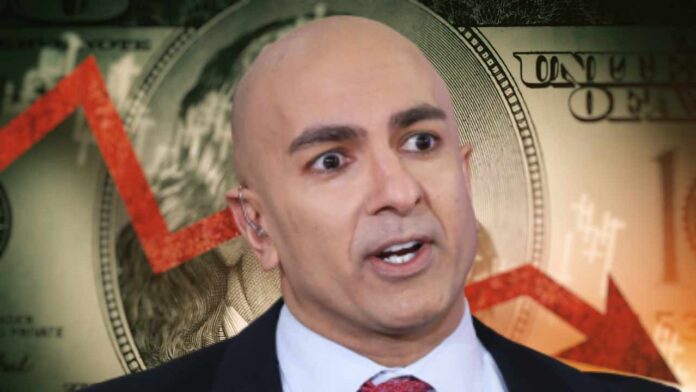The president of the Federal Reserve Bank of Minneapolis, Neel Kashkari, says the current banking crisis has pushed the U.S. economy closer to a recession. “We have fundamental issues, regulatory issues facing our banking system,” the Fed official stressed.
Neel Kashkari on U.S. Economy, Banking Crisis, Recession
Federal Reserve Bank of Minneapolis President Neel Kashkari shared his thoughts on the state of the U.S. economy, the current banking crisis, and whether the U.S. is headed toward a recession in an interview with CBS News Sunday.
Responding to a question about whether the present banking crisis has caused the U.S. economy to edge closer toward a recession, Kashkari said:
It definitely brings us closer. Right now, what’s unclear for us is how much of these banking stresses are leading to a widespread credit crunch.
“That credit crunch … would then slow down the economy,” he cautioned, noting that the Fed is monitoring the situation “very, very closely.”
“Such strains could then bring down inflation. So we have to do less work with the federal funds rate to bring the economy into balance,” Kashkari continued. “But right now, it’s unclear how much of an imprint these banking stresses are going to have on the economy.”
Several major banks, including Silicon Valley Bank and Signature Bank, failed in recent weeks, prompting the Federal Reserve, Treasury Department, and Federal Deposit Insurance Corporation (FDIC) to step in and protect depositors.
Kashkari was asked whether more regulations are needed to prevent bank failures and if the FDIC deposit insurance should be raised above $250,000. Additionally, he was questioned whether the 2018 rollbacks on the regulation of mid-sized banks should be reinstated. The Economic Growth, Regulatory Relief, and Consumer Protection Act of 2018 reversed some of the regulations that were implemented following the 2008 financial crisis.
The Fed official replied:
Well, we have fundamental issues, regulatory issues facing our banking system. I have argued for years that the biggest banks in the world are still too big to fail.
Commenting on deposit outflows from smaller banks to larger institutions, the Fed bank president stressed: “The reason that deposits are flowing to the big banks, the reason that Credit Suisse was bailed out by the Swiss government, is because banks have this premium position, and it’s unfair.” He elaborated:
It’s an unfair playing field that puts enormous pressure on regional banks and community banks, and that needs to be addressed. We need regional banks in America, we need community banks in America.
“Once we get through this stress period, we have to come up with a regulatory system that both ensures the soundness of our banking system, but it’s also fair and even, so the community banks and regional banks can thrive. We do not have that today,” Kashkari concluded.
Some people have urged the government to extend their bailout to smaller banks. Billionaire Bill Ackman recently said, “We are heading for a train wreck,” warning of permanent damage to smaller banks if the government allows the current banking crisis to continue.
What do you think about the statements by Federal Reserve Bank of Minneapolis President Neel Kashkari? Let us know in the comments section below.
Image Credits: Shutterstock, Pixabay, Wiki Commons
Disclaimer: This article is for informational purposes only. It is not a direct offer or solicitation of an offer to buy or sell, or a recommendation or endorsement of any products, services, or companies. Bitcoin.com does not provide investment, tax, legal, or accounting advice. Neither the company nor the author is responsible, directly or indirectly, for any damage or loss caused or alleged to be caused by or in connection with the use of or reliance on any content, goods or services mentioned in this article.
Credit: Source link






















 Bitcoin
Bitcoin  Ethereum
Ethereum  XRP
XRP  Tether
Tether  Solana
Solana  USDC
USDC  Dogecoin
Dogecoin  Cardano
Cardano  Lido Staked Ether
Lido Staked Ether  TRON
TRON  Wrapped Bitcoin
Wrapped Bitcoin  Chainlink
Chainlink  Wrapped stETH
Wrapped stETH  Avalanche
Avalanche  Sui
Sui  Stellar
Stellar  Litecoin
Litecoin  Toncoin
Toncoin  Shiba Inu
Shiba Inu  LEO Token
LEO Token  Hedera
Hedera  USDS
USDS  Hyperliquid
Hyperliquid  Polkadot
Polkadot  WETH
WETH  MANTRA
MANTRA  Bitcoin Cash
Bitcoin Cash  Bitget Token
Bitget Token  Ethena USDe
Ethena USDe  Wrapped eETH
Wrapped eETH  Uniswap
Uniswap  Monero
Monero  NEAR Protocol
NEAR Protocol  WhiteBIT Coin
WhiteBIT Coin  Pepe
Pepe  Aave
Aave  Ondo
Ondo  Bittensor
Bittensor  Aptos
Aptos  Dai
Dai  Internet Computer
Internet Computer  Official Trump
Official Trump  Mantle
Mantle  Ethereum Classic
Ethereum Classic  Tokenize Xchange
Tokenize Xchange  OKB
OKB  Gate
Gate  sUSDS
sUSDS  Sonic (prev. FTM)
Sonic (prev. FTM) 
